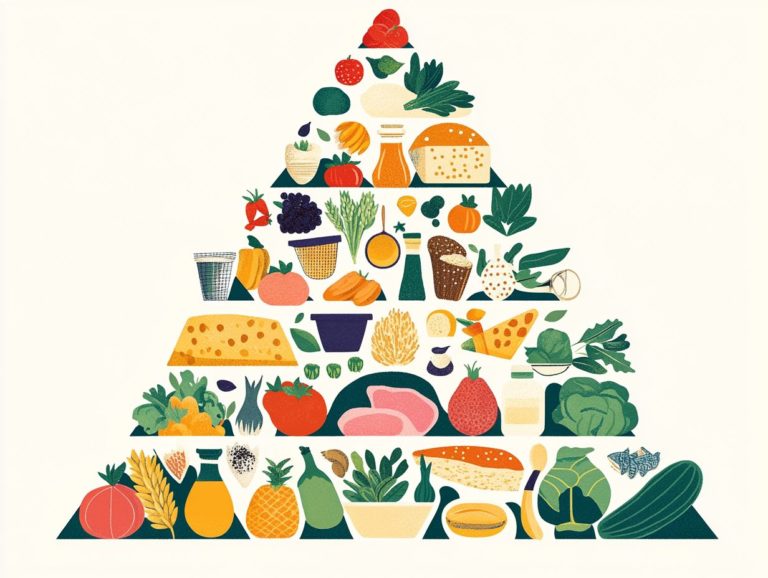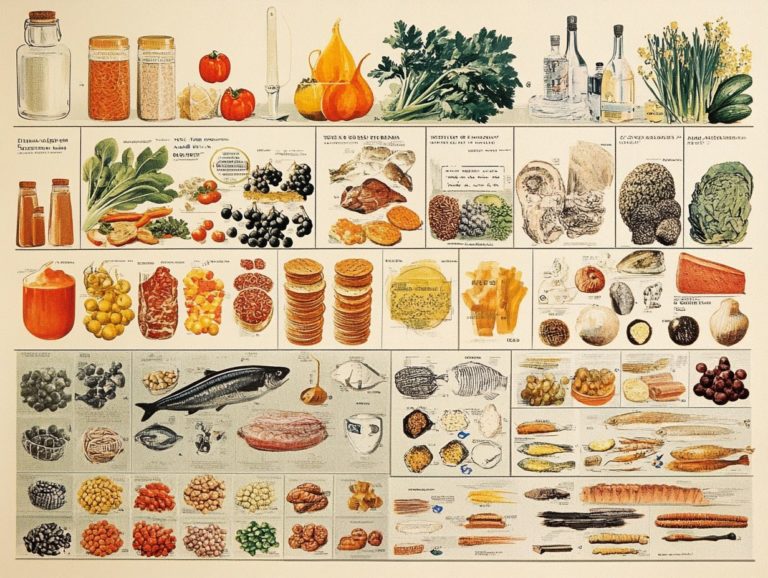Dietary Guidelines for a Plant-Based Diet
Curious about the advantages of adopting a plant-based diet? This article delves into various aspects, from enhanced health benefits to the positive environmental impact and ethical considerations that come with it.
You ll uncover practical tips for making a smooth transition to this lifestyle, essential nutrients to ensure you meet your dietary needs, and delicious meal planning ideas to keep your taste buds satisfied.
Whether you re contemplating a full shift or simply want to integrate more plant-based options into your meals, there s valuable insight here for everyone.
Contents
- Key Takeaways:
- What is a Plant-Based Diet?
- The Benefits of a Plant-Based Diet
- How to Transition to a Plant-Based Diet
- Key Nutrients to Focus on
- Meal Planning and Recipe Ideas
- Frequently Asked Questions
- What is a plant-based diet?
- What are the benefits of following a plant-based diet?
- How can I get enough protein on a plant-based diet?
- Are there any nutrients that I need to pay special attention to on a plant-based diet?
- Can I still eat out and follow a plant-based diet?
- Are there any potential challenges or drawbacks to following a plant-based diet?
Key Takeaways:

- A plant-based diet can improve health outcomes and positively impact the environment and ethical considerations.
- Incorporating more plants into your diet can be as simple as adding a serving of vegetables to every meal and trying new plant-based recipes.
- Key nutrients to focus on in a plant-based diet include protein, iron, calcium, and vitamin B12. Meal planning and a variety of plant-based foods can ensure you get these nutrients.
What is a Plant-Based Diet?
A plant-based diet is a refined approach to nutrition that emphasizes whole, minimally processed fruits, vegetables, legumes, whole grains, nuts, and seeds, while limiting or excluding animal products. For those interested in this lifestyle, meal planning for a plant-based diet can be incredibly helpful.
You ll be surprised at the variety of delicious options this diet offers! It encompasses several eating patterns, such as:
- Vegetarian
- Vegan
- Flexitarian
- Lacto-vegetarian
- Ovo-vegetarian
- Pescatarian
Each of these options promotes a rich array of nutrient-dense foods, designed to meet your nutritional needs and enhance your overall health and well-being.
The Benefits of a Plant-Based Diet
The advantages of adopting a plant-based diet are significant. Research shows that this lifestyle choice can lower the risk of chronic diseases, including heart disease, diabetes, and some types of cancer.
It also supports brain health and aids in weight management, effectively tackling obesity and enhancing overall well-being.
Improved Health Outcomes
Adopting a plant-based diet offers many health benefits. Research shows that people who embrace this lifestyle often have lower rates of heart disease, diabetes, and obesity.
Studies published in reputable journals like ‘Nutrients’ highlight the abundance of fiber, vitamins, and minerals in these diets, contributing significantly to overall well-being. For example, one notable study revealed that participants consuming diets rich in fruits, vegetables, legumes, and whole grains experienced significantly reduced cholesterol levels and better blood sugar control.
This suggests that the diverse array of nutrients found in plant-based foods plays a crucial role in enhancing health. By incorporating these nutrient-dense options into your meals, you not only promote effective weight management but also support cardiovascular health.
This clearly demonstrates the compelling connection between your dietary choices and long-term wellness.
Environmental and Ethical Considerations

Embracing a plant-based diet not only enhances your health but also plays a vital role in sustainable eating practices. By choosing this path, you significantly reduce the environmental impact linked to animal agriculture and promote ethical food choices that reflect your commitment to ecological preservation.
When you opt for a plant-centric approach, you’re actively contributing to reducing greenhouse gas emissions, primarily produced by livestock farming. In doing so, you re aiding the fight against climate change. Plus, the cultivation of plant-based foods typically requires much less water and land than what’s needed for meat production, leading to more efficient resource use and less deforestation.
By adopting these dietary habits, you re promoting animal welfare, sparing countless creatures from the suffering and exploitation inherent in industrial farming. This lifestyle choice not only fosters a healthier planet but also champions ethical considerations that resonate through your efforts in environmental stewardship and compassion.
How to Transition to a Plant-Based Diet
Transitioning to a plant-based diet can be an exciting journey when you have a thoughtfully crafted meal plan and the support of a healthcare provider.
This approach allows you to gradually introduce more plant-based foods into your meals while still savoring a balanced diet that fulfills your nutritional requirements.
Embracing this lifestyle becomes not just manageable, but also enjoyable.
Tips for Incorporating More Plants into Your Diet
Incorporating more plants into your diet is a straightforward endeavor that can be achieved with a few simple strategies. Start by adding a variety of healthy foods to your meals, cutting back on processed options, and exploring new whole grains and legumes to craft balanced, satisfying dishes.
As you gradually introduce colorful fruits and vegetables into your daily meals, you ll uncover exciting new flavors while reaping the benefits of essential vitamins and minerals.
Consider beginning with small changes, such as swapping out a processed snack for a fresh piece of fruit or a handful of nuts.
Emphasizing meal planning can further solidify this transformation. By dedicating time each week to prepare nutritious recipes, you can ensure your plate is diverse, featuring legumes, whole grains, and seasonal produce. This will lead to a healthier lifestyle.
Key Nutrients to Focus on
When you adopt a plant-based diet, it’s crucial to pay special attention to certain key nutrients. Specifically, calcium, vitamin B-12, iron, and omega-3 fatty acids deserve your focus.
By doing so, you can ensure that you meet all dietary guidelines and fulfill your nutritional needs effectively.
Ensuring Adequate Intake on a Plant-Based Diet

To ensure you’re getting all the essential nutrients on a plant-based diet, it’s crucial to incorporate a variety of sources for calcium, vitamin B-12, iron, and omega-3 fatty acids. Understanding the role of a plant-based diet promotes optimal health and well-being.
Start by including leafy greens, like kale and collard greens, to significantly boost your calcium intake. Enriched plant milks and tofu are excellent additions as well.
For vitamin B-12, look to nutritional yeast and enriched cereals to fill the gap.
Iron can often be a concern in plant-based diets, but you can find it in lentils, chickpeas, and quinoa. Pair these foods with vitamin C-rich options, such as bell peppers or citrus fruits, to enhance absorption.
Don t forget about omega-3 fatty acids; you can source these from flaxseeds and walnuts.
By thoughtfully combining these elements in your meals like a vibrant quinoa salad with chickpeas and a zesty citrus dressing you can create balanced plates that truly support your nourishing dietary habits.
Meal Planning and Recipe Ideas
Meal planning serves as a strategic method to ensure your plant-based diet remains both balanced and nutritious.
It opens the door to a world of creative recipe ideas, allowing you to incorporate a diverse array of healthy foods that cater to your taste preferences.
Creating Balanced and Delicious Plant-Based Meals
Creating balanced and delicious plant-based meals means artfully combining a variety of healthy foods, such as legumes, whole grains, and vibrant vegetables, to ensure a dining experience that is both satisfying and wholesome.
By thoughtfully choosing ingredients like pairing brown rice with black beans, tossing in colorful bell peppers, and finishing with a squeeze of lime you can delight even the most discerning taste buds.
Incorporating seasonal vegetables not only enhances the flavors but also adds an element of surprise to each bite.
Experimenting with spices, such as smoky paprika or fresh basil, allows you to harmonize these ingredients while catering to various taste preferences. Adding healthy fats from avocados or nuts introduces satisfying textures that keep the meal engaging, transforming every dining occasion into a true celebration of taste.
Frequently Asked Questions
What is a plant-based diet?

A plant-based diet focuses on eating mostly whole foods like fruits, vegetables, whole grains, legumes, nuts, and seeds. This diet limits or avoids animal products such as meat, dairy, and eggs. If you’re interested in making this change, check out our guide on how to transition to a plant-based diet.
What are the benefits of following a plant-based diet?
Following a plant-based diet has many benefits. It lowers the risk of chronic diseases like heart disease, type 2 diabetes, and some cancers.
This diet can also help with weight management and improve digestion, promoting overall health.
How can I get enough protein on a plant-based diet?
You can get plenty of protein from a plant-based diet! Foods like beans, lentils, tofu, tempeh, nuts, and seeds are excellent sources.
Try to include a variety of these in your meals to ensure you get all the essential amino acids, which are the building blocks of protein.
Are there any nutrients that I need to pay special attention to on a plant-based diet?
A well-planned plant-based diet can provide all the nutrients you need. However, it’s important to pay special attention to iron, calcium, vitamin B12, and omega-3 fatty acids. For more information, consider navigating dietary guidelines as a vegetarian.
Incorporate foods rich in these nutrients or consider supplements if necessary.
Can I still eat out and follow a plant-based diet?
Absolutely! You can enjoy eating out while sticking to your plant-based lifestyle. Many restaurants offer plant-based options.
It s a good idea to research beforehand and choose eateries known for their plant-based choices.
Are there any potential challenges or drawbacks to following a plant-based diet?
Some challenges may include ensuring you get all necessary nutrients and facing limited options in social settings. You might also deal with cravings for non-plant-based foods.
With proper planning and knowledge, these challenges can be managed. The benefits of a plant-based diet often outweigh any drawbacks!






